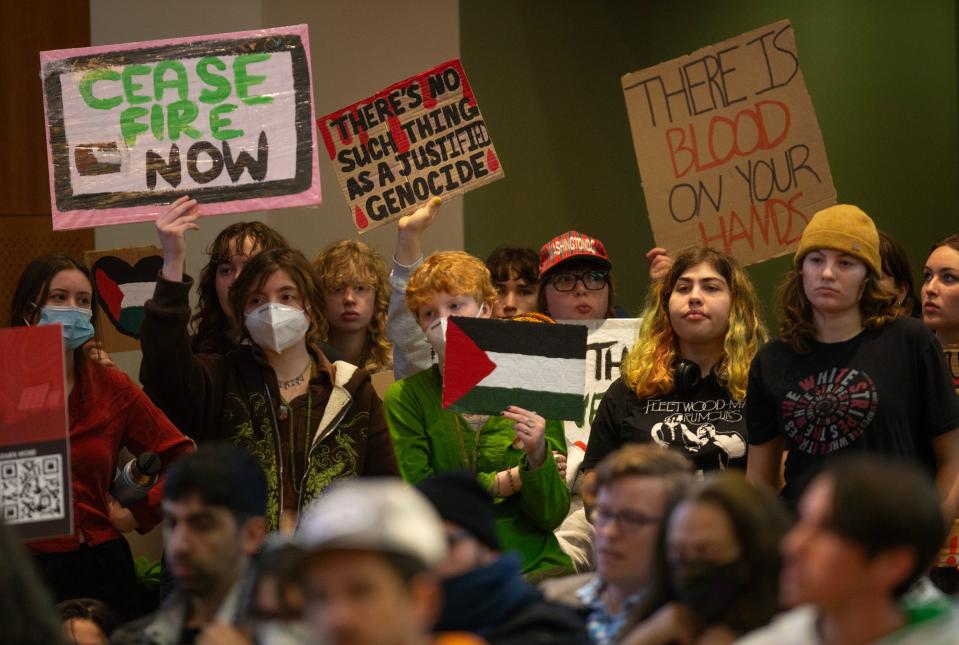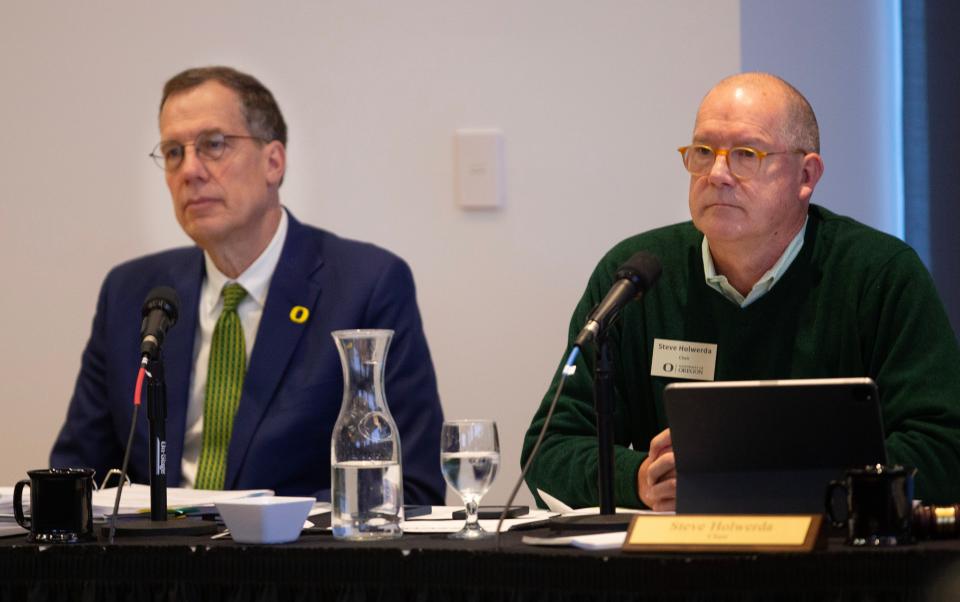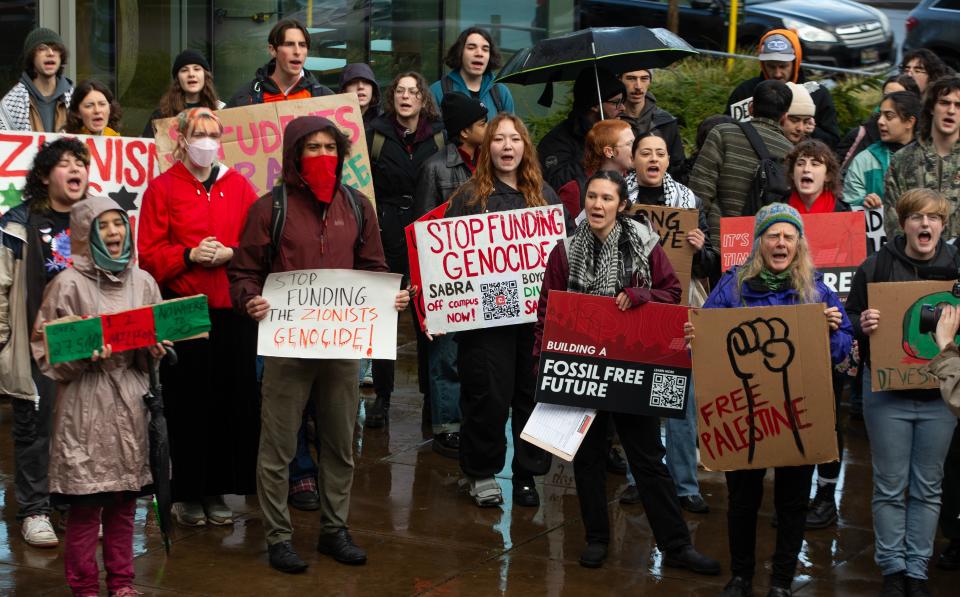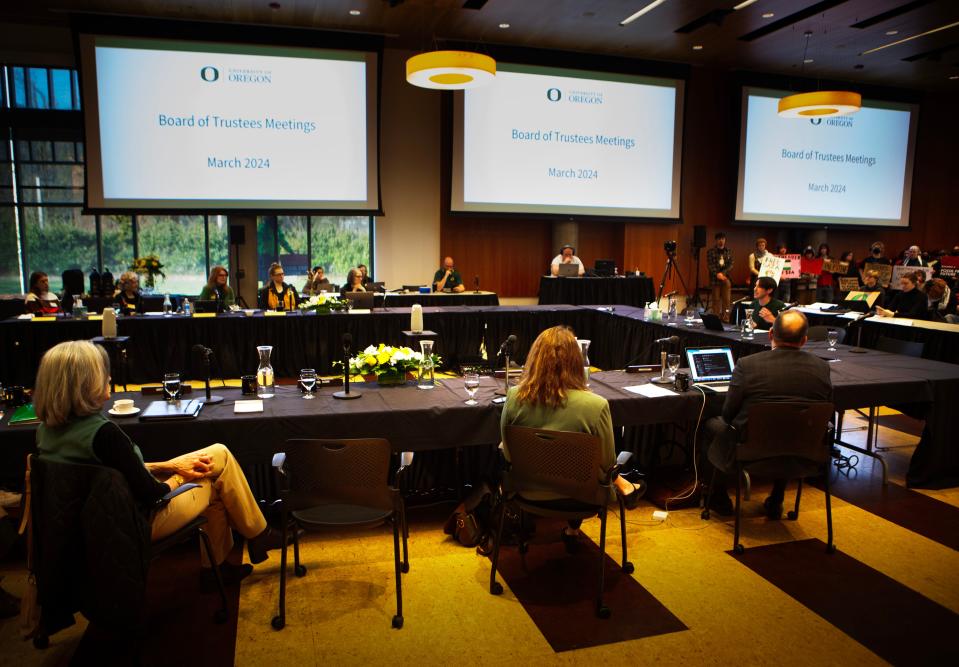University of Oregon students support a Palestine, climate action at trustees meeting
More than 100 University of Oregon students pushed administrators and the Board of Trustees toward radical climate action and divestment in companies that support Israel during a rally Tuesday and public comments.
Students gathered in front of UO's Ford Alumni Center ahead of the trustees meeting, carrying signs and chanting in what they called the "Rally for Student Futures." The rally was a joint effort organized by UO Climate Justice League and UO Students for Justice in Palestine (SPJ).
"It became clear months ago that this Board of Trustees meeting was going to be a pressure point for both of our organizations in our campaigns," said Valentine Bentz, a junior who is co-director of UO's Radical Organizing and Activism Resource Center.
"We came together, also understanding that our issues are intrinsically linked," Bentz said. "Palestinian justice, and climate justice are the same issue. The same players control the outcomes, the Board of Trustees being one of them."

During the rally, he gave a speech, calling the trustees and UO administration "criminally complicit" in the deaths of tens of thousands of Palestinians and saying both have historically gone against student, faculty and community wishes.
Bentz said demonstrating gives him and his peers energy to continue calling for action.
"We understand that we have to make ourselves heard," Bentz said. "We can't just speak, we have to act. We have to organize. We have to run campaigns. We have to show up. We have to come to rallies."
Salem Koury, a freshman and president of SJP, is a second-generation Palestinian-American. They said the SJP community has been their "life force" throughout the rise in violence in Palestine.
"I live every day with grief and sadness. It's hard to even go to things like this," Koury said. "Each day, I hear more sad news. But I will never shy away from it. I will accept everything. I will be as acutely informed as I can be, to adequately project what is ongoing right now, which is genocide, and any claims of otherwise are falsified through the fact that 30,000 people are dead, and it continues to increase."
She said UO President Karl Scholz's two statements on the conflict in Israel and Palestine did not mention the word Palestine. He also has not affirmed the safety of Arab, Palestinian and Muslim students on campus who feel threatened, according to Koury.
"We feel unheard," she said. "We feel unsafe, and the university has done nothing to provide any safety or resources for us, much less speak out against genocide."

Public comment from UO student groups
Following the rally, a group of students crowded into the Ford Alumni Center for the board meeting while several others stayed outside, waving signs calling for climate action and divestment.
The board received about 30 requests to speak. The board decided to limit each commenter's time from three to two minutes because of the number of requests.
Twenty-two commenters spoke in support of climate action and/or a free Palestine, asking the UO to divest from companies that financially support Israel such as Sabra, Motorola and HP and invest in emission reductions.
"Since my first day at UO it was shoved down my throat how this institution thrives on multiculturalism, and how deeply committed they are to opposing injustice," said student Iman Zarlons. "However, I can now speak for everyone here when I say this mission is severely performative. The audacity to continue to provide extensive support to Israel in the form of partnerships, investments, grants and more illustrate an undeniable hole in this institution's so-called fundamental values of equity and inclusion, as well as climate justice."
Student Carolyn Roderique asked the trustees to reflect on their actions.
"Gaza has no universities left," Roderique said. "How will history remember the University of Oregon? Will we be another institution complicit in the annihilation of the Palestinian people? Or will we do our part to bring peace and justice? I encourage each of you to reflect on how your actions will be remembered."
Student David Lefèvre pointed to a history of the board ignoring demands from students and staff, mentioning the return to in-person classes amidst concerns over public health during the COVID-19 pandemic, keeping UO police armed despite calls to divert funds to other options and "refusing" to take the Graduate Teaching Fellows Federation union seriously in bargaining until the group threatened to strike.
"In my time here on campus, the Board of Trustees have repeatedly shown their unwillingness to act in the interests of the students and the workers who make the UO function," Lefèvre said.

Near the end of the public comment section, four individuals called for more protections for Jewish students, saying on-campus protests have left them feeling unsafe.
"The lack of enforcement of the rules that all students are required to follow and the impact that had and will have on a minority group leaves me with little faith that the university will do what it needs to do to protect our safety if matters get worse," student Rayna Davis said, referencing a recent protest inside UO's Erb Memorial Union. "It pains me to say that I no longer feel entirely welcomed in a space that was once integral to my university experience."
Several of the students who spoke earlier in public comment, supporting divestment said they were Jewish. And several students shouted from the audience, declaring their support of a free Palestine as Jewish students.
At the end of the public comment segment, Board of Trustees chair Steve Holwerda addressed the students.
"Everyone in this room has something in common, we're all human. We all have emotions, love and hate," Holwerda said. "What we support here is the orderly and safe freedom of expression at the University of Oregon."
"We want you to support the right for people to express what they believe, safely and respectfully," he said.
Thermal energy report discussion
Many of the students were inspired to rally with the release a report from a taskforce charged with finding potential pathways to reduce greenhouse gas emissions at the university by decarbonizing its existing Eugene campus heating system, which is primarily run by natural gas boilers.
This report was given by taskforce facilitators Brian Fox, UO's associate vice president for budget, financial analysis, and data analytics and Steve Mital, UO director of energy and sustainability, during Monday's Finance and Facilities Committee meeting.
The taskforce consisted of 20 people, including students, faculty, UO administrators and two trustees − Lillian Moses and Marcia Aaron.
Administrators presented the report as the first of many conversations.
Four option were presented:
Option 2a: Transition gas boilers to a total of electrode boilers, using electricity to power the steam heating system. An 18 megawatt boiler system would take on 95% of UO's heating needs, reducing annual emissions by 78% in 2028. It would cost an estimated $29.7 million for the conversion.
Option 2b: Transition gas boilers to electrode boilers, using electricity to power the steam heating system. An 8 megawatt boiler system would take on 54% of UO's heating needs, reducing annual emissions by 45% in 2028. The conversion would cost about $14.9 million.
Option 3: Transition to a heat pump chiller, which cools buildings using cold water and produces heat in exchange that can be repurposed into hot water. These systems are "extremely efficient," reducing maintenance. The heat pump chiller would electrify 58% of UO's heating needs, reducing annual emissions by 26% in 2028 and 54% in 2043. It would cost an estimated $669.6 million after Inflation Reduction Act credits.
Option 4: Transition to geo-exchange system, which stores heat during the summer to use in the winter. These systems are "extremely efficient" and "cutting-edge," reducing maintenance. The geo-exchange would electrify 86% of UO's heating needs, reducing annual emissions by 29% in 2028 and 76% in 2043. It would cost an estimated $603.9 to $715.2 million after IRA credits.
Options 2a and 2b would largely fit within the current gas boiler system, as both power heat through steam. Options 3 and 4 would require extensive changes to the infrastructure of the campus heating system.
The steam lines that are about 12 to 18 inches in diameter would not need to change for the electric options. For the latter options, hot water pipes would need to be about 3 to 6 feet in diameter, meaning on-campus construction for an estimated 12 years − broken into six two-year phases. Individual buildings also would need to be converted to hot water heating systems.

The taskforce recommended option 2b, the least expensive option which could be implemented the quickest.
"Option 2b would be the first step, it's not the final step," Mital said. "It cuts our emissions roughly in half. We would still be obligated to figure out how to reduce that remaining half by 2050 to be directionally consistent."
CJL students and supporters asked the board to adopt option 4. The group presented a petition with 209 signatures in agreement. Several community groups, including the Eugene Sustainability Commission, also support option 4.
"It's the most efficient option by far, the most innovative option, it is the most expensive, but we understand as campus continues to develop that it's going to need an overhaul of its entire heating system at some point," Bentz said. "Option 2 is a band aid. It also will, according to us, significantly affect the electricity sales in the city, and most likely have a really significant cost burden on a typical electricity consumers, including most disproportionately affecting poor, low-income BIPOC people.
"This university is the wealthiest institution in the city, they should be taking on the majority of the burden for their own systems."
The board did not take action, but asked for Scholz's thoughts on the options.
"We will continue to discuss the findings of thermal taskforce," Scholz said. "I continue to learn and want to hear voices ... I think there's a lot of great work where we can continue to be leaders in this space."
Miranda Cyr reports on education for The Register-Guard. You can contact her at mcyr@registerguard.com or find her on Twitter @mirandabcyr.
This article originally appeared on Register-Guard: University of Oregon students rally for Palestine, climate action

